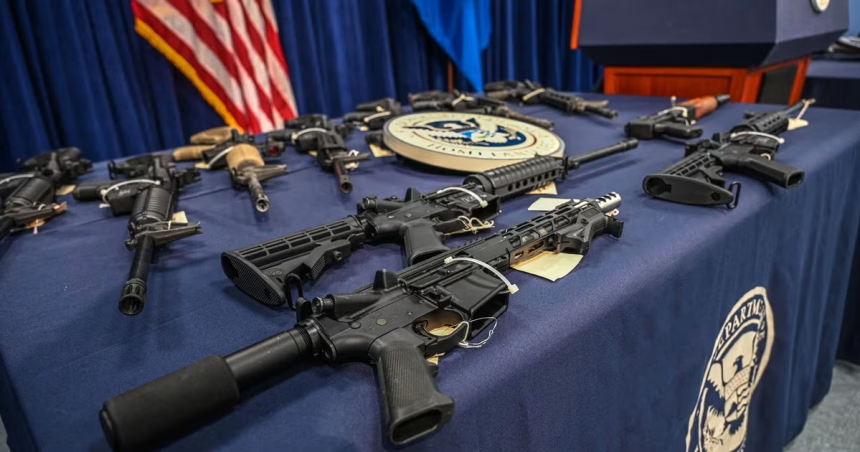The recent conviction of a Chinese man jailed in US for sending weapons to North Korea has stirred international debate over arms trafficking, sanctions enforcement, and the geopolitics surrounding North Korea’s weapons program. The case sheds light on the shadowy global networks that sustain Pyongyang’s illicit trade, the legal challenges in prosecuting such crimes, and the broader implications for US-China relations.
Background of the Case
The individual at the center of this case, a Chinese businessman, was found guilty of illegally exporting weapons-related technology and equipment to North Korea in violation of international sanctions. According to the US Department of Justice, he conspired to ship sensitive items—including firearms components and military-grade materials—to North Korea through third-party countries.
Prosecutors argued that these activities directly undermined global efforts to curb North Korea’s nuclear ambitions and weapons proliferation. By circumventing international monitoring, the businessman enabled Pyongyang to strengthen its military capacity despite a heavily sanctioned environment.
The US court sentenced him to a lengthy prison term, sending a strong message about Washington’s resolve to crack down on international arms trafficking.
Why the Case Matters
The imprisonment of a Chinese man jailed in US for sending weapons to North Korea is not just a matter of one individual’s wrongdoing. It has broader implications:
International Security Threat – North Korea’s access to weapons and related technology undermines peace in the Asia-Pacific region and beyond.
Sanctions Enforcement – The case highlights the effectiveness of US sanctions but also exposes loopholes exploited by traffickers.
US-China Relations – It raises questions about how much Beijing can or will do to prevent its citizens from aiding Pyongyang.
Global Arms Trade – The trial reveals how sophisticated and concealed arms networks operate under layers of false companies and fraudulent shipping documents.
North Korea’s History of Illicit Weapons Trade
North Korea has long relied on secretive networks to import prohibited goods and export weapons to fund its regime. From missile technology exchanges in the Middle East to alleged cybercrimes, Pyongyang’s survival has depended on illicit international transactions.
Reports from the UN Panel of Experts on North Korea frequently cite cases of Chinese middlemen and companies involved in smuggling dual-use goods—products with both civilian and military applications.
The sentencing of this Chinese man provides rare courtroom evidence of how such networks function, often using shell companies in Southeast Asia, false labeling of cargo, and cryptocurrency payments to avoid detection.
Expert Reactions
International analysts see this conviction as significant.
Mark Fitzpatrick, arms control expert, noted: “Every successful prosecution weakens the logistical backbone of North Korea’s weapons trade. The challenge is that for every trafficker jailed, several others step in.”
US State Department officials praised the court ruling, saying it demonstrates America’s commitment to enforcing sanctions “wherever violators may be located.”
Chinese observers expressed concern that such cases could worsen US-China tensions at a time when bilateral relations are already strained over trade, Taiwan, and military competition.
Legal Framework and International Law
The United Nations Security Council (UNSC) has passed multiple resolutions since 2006 banning the transfer of arms and weapons-related material to North Korea. These sanctions are binding on all member states, including China.
The United States enforces its own additional sanctions through laws like the International Emergency Economic Powers Act (IEEPA) and the North Korea Sanctions and Policy Enhancement Act. Under these frameworks, individuals and companies can face prosecution in US courts for violating restrictions, even if the conduct took place overseas but involved US-origin goods or transactions linked to US banking systems.
This explains why the Chinese man jailed in US for sending weapons to North Korea could be prosecuted under American law despite operating outside US borders.
Implications for US-China Relations
The case touches on a delicate diplomatic issue. While the Chinese government officially supports UN sanctions against North Korea, US officials have long accused Beijing of lax enforcement. Many illicit traders operate in Chinese border cities, benefiting from weak oversight or local protectionism.
Washington has pressured China to crack down harder, warning that failing to do so could enable North Korea’s weapons program to thrive. With this case now resolved, Beijing faces new scrutiny over how many other similar networks may still be active.
For US-China relations already strained by trade disputes and military rivalry in the South China Sea, this case adds another layer of tension.
The Role of Sanctions in Containing North Korea
Sanctions are the main tool the international community uses to constrain Pyongyang’s weapons development. They target everything from coal exports and luxury goods to oil imports and access to the global financial system.
Yet, sanctions work only if all countries enforce them. The conviction of a Chinese trafficker shows that loopholes remain. Smugglers exploit weak enforcement in certain jurisdictions, and North Korea’s ability to adapt has kept its weapons programs alive.
According to a 2024 UN report, North Korea continues to expand its missile arsenal, suggesting that enforcement gaps remain a critical issue.
Broader Geopolitical Significance
The case also demonstrates how the United States projects its legal power globally to deter violations of international norms. By prosecuting a foreign national in its own courts, Washington signals that no violator is beyond reach.
However, this approach can also create diplomatic friction. Critics argue that the extraterritorial application of US law may be perceived as overreach, particularly in China, where nationalist sentiment is already high.
At the same time, the ruling is likely to be welcomed by South Korea, Japan, and other US allies concerned about North Korea’s growing missile threat.
FAQs
Who was the Chinese man jailed in the US for sending weapons to North Korea?
His identity has not been fully disclosed publicly due to ongoing investigations, but he was a Chinese businessman accused of exporting arms and military-grade items to North Korea in violation of sanctions.
Why was he prosecuted in the United States?
The prosecution was based on violations of US sanctions laws, particularly because the weapons involved US-origin components and financial transactions that passed through US banking systems.
How does this case affect US-China relations?
The case could worsen tensions, as the US frequently accuses China of not fully enforcing sanctions on North Korea. Beijing may view the prosecution as politically motivated.
What sanctions exist against North Korea?
Multiple UN Security Council resolutions ban arms trade with North Korea, alongside strict US sanctions targeting its economy, banking system, and weapons program.
Does this case mean North Korea’s weapons trade is ending?
Not entirely. While it disrupts one network, experts warn that North Korea has multiple smuggling channels and remains adept at evading sanctions.
Conclusion
The conviction of a Chinese man jailed in US for sending weapons to North Korea is more than a criminal case—it is a window into the complexities of international law, the persistence of illicit trade, and the high stakes of global security.
It underscores the challenges of enforcing sanctions in a world of shadowy networks and geopolitical rivalries. For Washington, it is a victory against proliferation. For Beijing, it is a test of its responsibility as a global power. And for the international community, it is a reminder that vigilance is the price of peace.


















